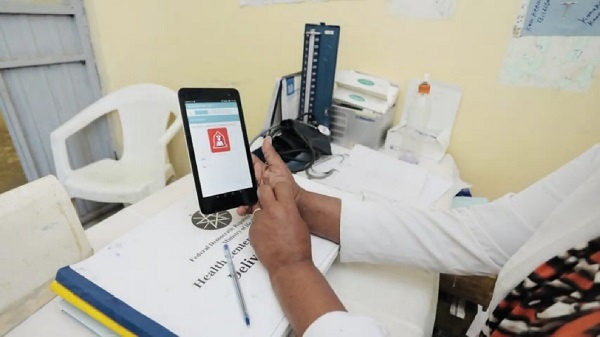
ADDIS ABABA (JSI) – In Ethiopia, approximately 40,000 trained health extension workers (HEWs) act as the nation’s frontline health workforce, each serving about 2,500 individuals with health promotion, disease prevention, and basic curative services. They face a high workload due to the country’s large population. The government is currently digitizing the community health information system, called the electronic community health information systems, or eCHIS. This system is expected to bring tools and networks into place to digitize data, and automate workflows, enabling HEW performance management and supervision, while alleviating burdens placed on them by antiquated reporting systems.
Dessalew Emaway, the project director of the Electronic Community Health Information System Scale-up for Health Extension Program Improvement in Ethiopia, reflects on the importance of this health information system, its impact on HEWs and in strengthening the country’s health system.
Please give our readers a brief overview of the project and what it aims to achieve.
JSI, in partnership with Dimagi, LivingGoods, Simprints and, received funding from the Children’s Investment Fund Foundation (who funded this project) to supported the scale-up of eCHIS, which will to optimize implementation of the Health Extension Program (HEP), in general, and improve reproductive, maternal, newborn, and child health (RMNCH) outcomes, in particular. This five-year project, implemented in the five agrarian regions of Ethiopia, has three major objectives: i) improve quality of care, referral linkages, and use of data for evidence-informed decision-making at all levels of the health system; ii) unleash the power of eCHIS to transform community-level health data for health extension worker (HEW) performance management, targeting primary health services; and iii) design and implement performance management, incentive, and fingerprint biometrics interventions on the eCHIS platform that can be scaled nationally.
How is Ethiopia’s post COVID-19 environment impacting the health system and how does eCHIS fit in the country’s response, especially now with the ebbs and tides of COVID variants?
As it did in most areas of the world, COVID-19 strained Ethiopia’s health system and impacted uptake of essential health services. The country’s Ministry of Health (MOH) and the Health Extension Program leveraged its house-to-house surveillance system in order to detect and respond to the pandemic. In 2020, the MOH and partners, including JSI, developed a digital tool, integrated with the eCHIS digital platform, used by HEWs, community volunteers and health center workers to conduct house-to-house surveillance and promote non-pharmaceutical COVID-19 interventions (e.g., social distancing, mask-wearing, and handwashing) to the population. It later accelerated administration of COVID-19 vaccinations. JSI and partners supported the MOH to digitize screening guides and tools, train HEWs on COVID-19 and use of tools and strengthen the quality of house-to-house screening. This supported and digitized house-to-house surveillance network conducted COVID-19 screening and prevention education to nearly 4 million households nationwide every week.
Strengthening Ethiopia’s health system during conflict times is challenging. In your opinion, what approaches will help the project succeed despite these challenges? How did the conflict affect the project?
The conflict in the Northern part of the country (Amhara, Afar and Tigray regions) affected the health system. Many previously functioning health facilities were damaged and/or looted as were their surrounding infrastructures, while the demand for medical supplies and services grew. The conflict also resulted in a shifting of attention and resources away from the health sector. Most of the woredas JSI supports under the eCHIS project were in non-conflict affected geographies. However, in supported regions where conflicts expanded (namely Tigray to Amhara), we moved our staff out of the region to protect their safety, we held the undistributed tablets and other supplies to minimize the impact of looting and damage, and we revised our project plan to intensify to other regions such as Oromia and SNNPR. When the situation improved in the affected regions, we developed a catch-up implementation plan and resumed activities to fast track results in conflict-affected locations.
Continue reading this story on jsi.com
Summary of Ethiopia electronic Community Health Information System (eCHIS) Scale-up for HEP Improvement Project
By scaling the electronic Community Health Information System (eCHIS) to 8,000 additional health extension workers (HEWs) in Ethiopia, JSI will leverage the power of digitally enabled performance management to improve the coverage and quality of primary health care services. The investment will help transform the health extension program in Ethiopia through improved use of data for robust performance management of HEWs, leading to improved health outcomes for mothers, children, and adolescents.
The Ethiopia eCHIS project seeks to accomplish the following goals:
- Scale-up eCHIS to improve quality care, referral linkages, and access to data for decision making:
- Mapping and site selection;
- Deployment of eCHIS to 8,000 HEWs through a cascade training approach;
- Ensure ongoing system usage through mentorship and supportive supervision.
- Unleash the power of eCHIS to transform community-level health data for HEW performance management and targeting of primary health services:
- Strengthen data use processes at district levels and above;
- Design, test and validate new performance management models.
- Establish learning sites to incubate new innovations on the eCHIS platform that can be scaled nationally for an optimized health extension program.
This project is supported by the Children’s Investment Fund Foundation (CIFF).
Follow the project’s news and stories by clicking here.
